
Oda Abramovna Slobodskaya |
Oda Slobodskaya

There is a case when the expression “the same age as October” does not sound like a dense and half-forgotten stamp of the Soviet era, but takes on a special meaning. It all started like this…
“Dressed in a rich porphyry robe, with a scepter in my hands, with the crown of the Spanish King Philip on my head, I leave the cathedral to the square … At that moment, on the Neva, near the People’s House, a cannon shot suddenly sounds. As a king who brooks no objection, I listen sternly – is this a retort to me? The shot is repeated. From the height of the steps of the cathedral, I notice that the people have trembled. The third shot and the fourth – one after the other. My area is empty. The choristers and extras moved to the wings and, forgetting the heretics, began to loudly discuss which way to run … A minute later, people ran backstage and said that the shells were flying in the opposite direction and that there was nothing to fear. We stayed on stage and continued the action. The audience remained in the hall, also not knowing which way to run, and therefore decided to sit still.
Why guns? we asked the messengers. – And this, you see, the cruiser “Aurora” is shelling the Winter Palace, in which the Provisional Government meets …
This famous fragment from Chaliapin’s memoirs “The Mask and the Soul” is well known to everyone. It is less known that on this memorable day, October 25 (November 7), 1917, the debut on the opera stage of the then unknown young singer Oda Slobodskaya, who performed the part of Elizabeth, took place.
How many wonderful Russian talents, including singing ones, were forced to leave their native land after the Bolshevik coup for one reason or another. The hardships of Soviet life proved unbearable for many. Among them is Slobodskaya.
The singer was born in Vilna on November 28, 1895. She studied at the St. Petersburg Conservatory, where she studied in the vocal class with N. Iretskaya and in the opera class with I. Ershov. While still a student, she performed in Beethoven’s 9th symphony conducted by Sergei Koussevitzky.
After a successful debut, the young artist continued to perform at the People’s House, and soon appeared on the stage of the Mariinsky Theater, where she made her debut as Lisa (among other roles in those years were Masha in Dubrovsky, Fevronia, Margarita, Queen of Shemakhan, Elena in Mephistopheles). ). However, real fame came to Slobodskaya only abroad, where she left in 1921.
On June 3, 1922, the world premiere of F. Stravinsky’s Mavra took place at the Paris Grand Opera as part of Diaghilev’s entreprise, in which the singer played the main role of Parasha. Elena Sadoven (Neighbor) and Stefan Belina-Skupevsky (Hussar) also sang at the premiere. It was this production that marked the beginning of a successful career as a singer.
Berlin, tours with the Ukrainian choir in North and South America, performances in Mexico, Paris, London, Holland, Belgium – these are the main geographical milestones of her creative biography. In 1931, 10 years after joint performances in Petrograd, fate again brings Slobodskaya and Chaliapin together. In London, she participates with him in the tour of the opera troupe A. Tsereteli, sings the part of Natasha in “Mermaid”.
Among the most significant successes of Slobodskaya in 1932 at Covent Garden as Venus in Tannhauser together with L. Melchior, in the 1933/34 season at La Scala (part of Fevronia) and, finally, participation in the English premiere of D. Shostakovich’s opera “Lady Macbeth of the Mtsensk District”, performed in 1936 by A. Coates in London (part of Katerina Izmailova).
In 1941, at the height of the war, Oda Slobodskaya participated in the most interesting English project, carried out by the famous conductor, a native of Russia, Anatoly Fistulari*. Mussorgsky’s Sorochinskaya Fair was staged at the Savoy Theatre. Slobodskaya sang the role of Parasi in the opera. Kira Vane also participated in the project, describing this production in detail in her memoirs.
Along with performances on the opera stage, Slobodskaya worked very successfully on the radio, collaborated with the BBC. She participated here in the performance of The Queen of Spades, performing the part of the Countess.
After the war, the singer mainly lived and worked in England, actively conducting concert activities. She was a brilliant interpreter of chamber works by S. Rachmaninov, A. Grechaninov, I. Stravinsky and, especially, N. Medtner, with whom she repeatedly performed together. The singer’s work has been preserved in the recordings of the gramophone firms His Masters Voice, Saga, Decca (Medtner’s romances, works by Stravinsky, J. Sibelius, “Tatyana’s Letter” and even M. Blanter’s song “In the Front Forest”). In 1983, a number of Slobodskaya’s recordings were published by the Melodiya company as part of N. Medtner’s author’s disc.
Slobodskaya ended her career in 1960. In 1961 she visited the USSR, visiting relatives in Leningrad. Slobodskaya’s husband, a pilot, died during the war in the Battle of England. Slobodskaya died on July 30, 1970 in London.
Note:
* Anatoly Grigoryevich Fistulari (1907-1995) was born in Kyiv. He studied in St. Petersburg with his father, a well-known conductor in his time. He was a child prodigy, at the age of seven he performed Tchaikovsky’s 6th symphony with an orchestra. In 1929 he left Russia. Participated in various entreprises. Among the opera productions are Boris Godunov with Chaliapin (1933), The Barber of Seville (1933), The Sorochinskaya Fair (1941) and others. He performed with the Russian Ballet of Monte Carlo, the London Philharmonic Orchestra (since 1943). He also worked in the USA and New Zealand. He was married to the daughter of Gustav Mahler Anna.
E. Tsodokov





